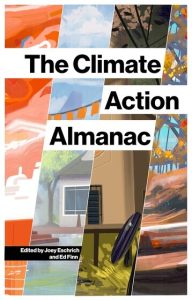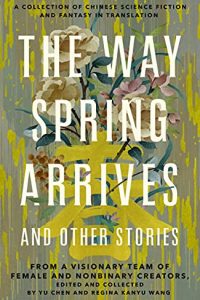Jake Casella Brookins Reviews The Climate Action Almanac edited by Joey Eschrich & Ed Finn
 The Climate Action Almanac, Joey Eschrich & Ed Finn, eds. (Center for Science and the Imagination) November 2023.
The Climate Action Almanac, Joey Eschrich & Ed Finn, eds. (Center for Science and the Imagination) November 2023.
Edited by Joey Eschrich and Ed Finn, The Climate Action Almanac is an online anthology that brings together a selection of science fiction and non-fiction to fire up our imaginations about climate change and the vast range of possible responses to it. Charmingly illustrated throughout by João Queiroz, the collection strikes a nice balance of positivity and realism, and is particularly good at expressing the size of both the challenges and the solutions – it never feels like it has the singular, definitive answer, but instead comes across as a sampling of people working towards a better future in many places, times, and realities.
Indeed, that’s a hallmark of the strongest story of the bunch, Libia Brenda’s “Cosmic Fire” (translated by Emma Törzs). A multicentury future history, or genealogy, the story unfolds after the 2025 eruption of a volcano in south-central Mexico triggers global upheaval. Following five women’s narratives across dramatically shifting settings, “Cosmic Fire” is remarkable for how it captures both change and resilience as fundamental aspects of life, and for how it incorporates evolving lifestyles, landscapes, and language. It’s perhaps ironic that shifting the major climate change actor to a nonhuman one allows Brenda to craft such a splendid story – one that doesn’t shy away from the immense cost of the change – and that, even with its magical or hallucinogenic interludes, feels so faithful to reality.
The Climate Action Almanac is presented by the Center for Science and the Imagination at Arizona State University, whose goal is to “create inspiring, inclusive, technically grounded visions of the future,” and MIT Press. The Climate Action Almanac’s approach is notably more restrained than CSI’s last such collection, the anthology Hieroglyph, way back in 2014. Where Hieroglyph collected visions of world-transforming “moonshots,” a largely celebratory expression of techno-optimism, The Climate Action Almanac is much more measured: positive and imaginative, but less sure that the very systems that got us into this mess will be the ones to get us out. In a recent review of MIT Press’s Tomorrow’s Parties (ed. Jonathan Strahan), another recent anthology of SF focused on Anthropocene presents and futures, Paul Graham Raven notes a shift away from the “hubristic hucksterism” of these kinds of simplistic, whizbang technological panaceas – The Climate Action Almanac, laudably, is (mostly) focused on more nuanced and complicated solutions.
Closest to that traditional “big idea” science fiction here – and intriguingly complicated – are Gu Shi’s two stories, both translated by Ken Liu. “Mothership Comes to the Heart of the Ocean,” presented from the point of view of a young girl, is a mildly utopian, slightly rose-glasses-wearing vision of a flexible floating city. The more interesting and ambivalent “City of Choice” centers on the technological responses to frequent deadly flooding in urban areas. While some of these innovations struck me as a bit cartoonish and neoliberal (such as modifying private vehicles with amphibious features), the core of the story grapples with the ethical questions surrounding an evacuation-assistance app. When it’s revealed that the program running the app is making long-term utilitarian decisions – picking who lives and dies based on their statistical profile – the central character, one of its designers, must decide what to do. While the story’s eventual skepticism towards life-altering AI policies is interesting, and certainly a point worth banging a drum about at this point in history, I’m actually more interested and impressed with how Shi leaves the central ethical questions on the table: what to do, what to sacrifice, when faced with society-wide existential risk and uncertainty, and who should be making those calls.
Elsewhere, The Climate Action Almanac is notable for its focus on interpersonal, communitybased solutions alongside the technological. Vandana Singh’s delightfully convoluted “Three-World Cantata” imagines a kind of simulated-multiverse social-engineering, shot through with fascinating imagery and intensely personal motivations. In Hannah Onoguwe’s “Death is Not an Ornament”, petro-infrastructural power is clawed back from exploitative forces, while “Notes for Adda”, focusing on structural racism and indifference in the tropics, imagines a growing popular resistance. I particularly like that Onoguwe’s stories focus on climate change’s human problem – that efforts towards a just and even habitable world are being actively resisted by some of the most powerful people on the planet. He’s certainly not the first to raise the issue, and his downplaying of counterecological forces might be the novel’s weakest point, but it feels significant that Kim Stanley Robinson seated the necessity of ecotage and assassination as the skeleton at the feast in The Ministry for the Future. It’s gratifying to see some of these stories engaging with the question; if Onoguwe’s solution is partially magical, it’s also very pointed.
It’s hard to present speculative fiction “for” something without reducing it to “message fiction,” and science communicators who aren’t skilled in the craft of SF can struggle to translate factual expertise to literary competency (a few entries here struggle under the weight of footnotes and parentheticals). Overall, The Climate Action Almanac’s structure plays to its contributor’s strengths, with the excellent “main” stories of each section supported by a range of shorter fiction, interviews, and creative and scholarly essays that are in turn lent momentum and interest by their chapters’ anchoring stories. Some of the strictly non fictional pieces here are quite moving, and many are as inspirationally informative as the fiction; two particularly standout pieces are Yudhanjaya Wijeratne’s “The Unwalkable City”, on the intersection of climate and urban design in Colombo, and Fabio Fernandes’s “Neostalgia”, a deeply thoughtful metacommentary on the role of ecological fiction. The Climate Action Almanac’s mix of forms is perhaps unsurprisingly, perhaps even intentionally, a bit of a mixed bag, and ultimately I think quite successful.
Jake Casella Brookins is from the Pennsylvania Appalachians, and spent a fantastic amount of time in the woods. He studied biology, before switching over to philosophy & literature, at Mansfield University. He’s been a specialty coffee professional since 2006. He’s worn a lot of coffee hats. He worked in Upstate New York and Ontario for about 8 years. He’s been in Chicago since 2013; prior to the pandemic, he worked for Intelligentsia Coffee in the Loop. Starting in 2021, he’s been selling books at a local indie bookstore. He lives with his wife, Alison, and their dogs Tiptree & Jo, in Logan Square.
This review and more like it in the May 2024 issue of Locus.
 While you are here, please take a moment to support Locus with a one-time or recurring donation. We rely on reader donations to keep the magazine and site going, and would like to keep the site paywall free, but WE NEED YOUR FINANCIAL SUPPORT to continue quality coverage of the science fiction and fantasy field.
While you are here, please take a moment to support Locus with a one-time or recurring donation. We rely on reader donations to keep the magazine and site going, and would like to keep the site paywall free, but WE NEED YOUR FINANCIAL SUPPORT to continue quality coverage of the science fiction and fantasy field.
©Locus Magazine. Copyrighted material may not be republished without permission of LSFF.






